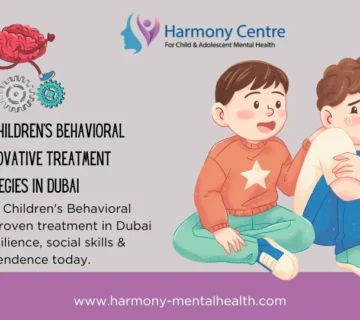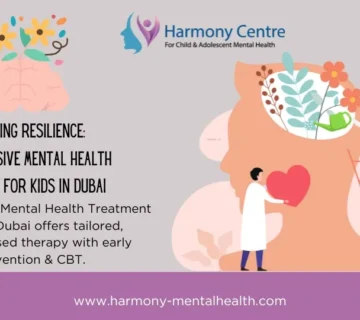Child ADHD Support Dubai: Empowering Young Minds with Effective Strategies
Discover child ADHD support in Dubai at Harmony Centre. Learn evidence‑based strategies, behavior therapy, and classroom accommodations to help children with ADHD thrive.
Contact Information
| Contact Method | Details |
|---|---|
| Phone | +971 (52) 8773268 / 04 558 2015 |
| Click Here | |
| info@harmony-mentalhealth.com | |
| Address | Office 409, Building Alrazi-64C, 26th St, Healthcare City, Dubai |
1. Introduction: Addressing ADHD in a Dynamic City
Attention-Deficit/Hyperactivity Disorder (ADHD) affects millions of children worldwide, and in Dubai—a city marked by rapid growth, multicultural influences, and competitive academic environments—its impact can be particularly challenging. Children with ADHD often struggle with concentration, impulsivity, and hyperactivity, which can hinder their academic performance, social interactions, and overall development.
At Harmony Centre, we believe that every child deserves the opportunity to succeed. Our integrated approach to child ADHD support in Dubai combines evidence‑based therapies, practical strategies, and personalized care designed to address the unique needs of each child. By providing comprehensive support that involves parents, educators, and specialists, we create a nurturing environment where children with ADHD can build skills, improve focus, and thrive.
2. Understanding ADHD: What It Means for Children
ADHD is a neurodevelopmental disorder characterized by symptoms of inattention, hyperactivity, and impulsivity. These symptoms can vary widely among children, affecting them in different ways.
Core Characteristics of ADHD
- Inattention:
Children with ADHD may struggle to concentrate on tasks, make careless mistakes, and have difficulty following instructions. They might appear forgetful or easily distracted in both academic and social settings. - Hyperactivity:
Hyperactive behaviors include excessive movement, fidgeting, and an inability to stay seated. These children often feel the need to be in constant motion, which can disrupt classroom activities and social interactions. - Impulsivity:
Impulsive actions, such as interrupting others, acting without thinking, or having difficulty waiting their turn, can lead to challenges in both academic and social environments.
How ADHD Impacts Daily Life
For children in Dubai, ADHD can influence multiple aspects of their lives:
- Academic Challenges:
In a high-pressure educational system, difficulties with attention and organization can lead to lower grades and frustration. - Social Difficulties:
Impulsive behavior and hyperactivity may lead to strained peer relationships or social isolation. - Emotional Strain:
Constant struggles in managing behavior can result in low self‑esteem, anxiety, and even depression. - Family Stress:
The daily challenges associated with ADHD often affect family dynamics, making support and understanding essential.
Understanding these challenges is the first step toward creating a tailored intervention plan that addresses each child’s unique needs.
3. Contributing Factors to ADHD in Dubai
Dubai’s dynamic environment presents both opportunities and unique stressors that can influence the manifestation of ADHD symptoms:
- High Academic Expectations:
The competitive educational landscape in Dubai can intensify ADHD symptoms. The pressure to excel academically may overwhelm children already struggling with inattention and impulsivity. - Multicultural Influences:
Dubai is home to diverse cultural backgrounds. The blending of different educational styles and cultural expectations can create additional challenges in managing ADHD symptoms. - Digital Overload:
With pervasive digital devices and social media, children are often exposed to high levels of digital stimulation. Excessive screen time may exacerbate attention difficulties and disrupt sleep patterns, which are critical for managing ADHD. - Environmental Distractions:
The bustling urban setting of Dubai—with its constant noise and activity—can make it harder for children with ADHD to focus and remain calm.
These factors emphasize the need for a comprehensive, individualized approach to support children with ADHD in Dubai.
4. Effective Strategies and Treatment Approaches
Treating ADHD in children requires a multi-faceted approach that combines clinical expertise with practical, everyday strategies. At Harmony Centre, our integrated model incorporates several evidence‑based treatment modalities tailored to each child’s needs.
A. Behavioral Therapy and Cognitive Techniques
Behavioral Therapy is a cornerstone of our approach. It focuses on modifying disruptive behaviors through structured interventions. Techniques include:
- Positive Reinforcement:
Rewarding desired behaviors to encourage repetition and build self‑esteem. - Behavioral Contracts:
Setting clear expectations and consequences for behaviors, creating a structured environment that fosters self‑regulation. - Skill-Building Exercises:
Teaching organizational skills, time management, and problem-solving to help children succeed in academic and social settings.
Cognitive Behavioral Therapy (CBT) helps children reframe negative thoughts and develop constructive coping strategies. Through CBT, children learn to:
- Identify irrational or unhelpful thought patterns.
- Develop practical techniques to manage distractions.
- Increase self‑awareness and build resilience.
B. Parent and Family Training
Effective ADHD management extends beyond individual therapy. Involving the family is crucial:
- Parental Guidance Workshops:
These sessions equip parents with strategies to support their child at home. Topics include establishing routines, effective discipline techniques, and managing digital consumption. - Family Therapy:
Involving the whole family in therapy sessions helps improve communication and resolve conflicts. This unified approach ensures that supportive strategies are reinforced at home. - Collaborative Problem-Solving:
Encouraging parents to work with their child to set achievable goals can empower the child and build self‑esteem.
C. School Collaboration and Accommodations
Schools play a vital role in managing ADHD. Harmony Centre collaborates with educators to create a supportive learning environment:
- Individualized Education Plans (IEPs):
Tailored plans that accommodate the unique needs of children with ADHD. These plans might include extra time on tests, modified assignments, or the use of assistive technology. - Teacher Training:
Educators are trained to identify signs of ADHD and implement strategies in the classroom that help maintain focus and reduce distractions. - Peer Support Programs:
Encouraging group activities and collaborative projects can foster a sense of belonging and help children develop better social skills.
D. Mindfulness and Physical Activity
Incorporating mindfulness and exercise into daily routines has shown significant benefits for children with ADHD:
- Mindfulness Practices:
Techniques such as deep breathing exercises, guided meditation, and mindful movement (e.g., yoga) can help reduce stress and improve concentration. - Regular Physical Activity:
Exercise is a natural stress reliever and can help manage hyperactivity. Activities such as sports, dance, or even regular outdoor play can be highly beneficial.
E. Integrative and Multidisciplinary Care at Harmony Centre
What sets Harmony Centre apart as the best option for child ADHD support in Dubai is our integrated, multidisciplinary approach. Our team of child psychiatrists, psychologists, and therapists collaborates to develop personalized treatment plans. We continuously monitor progress and adjust our strategies to ensure each child receives the most effective care.
By combining behavioral therapies, parent training, school collaboration, and mindfulness practices, we create a comprehensive support system that addresses every aspect of ADHD. This integrated approach not only reduces symptoms but also enhances the overall quality of life for children and their families.
5. The Role of Parents, Educators, and the Community
Effective ADHD management requires a united effort from parents, educators, and the community.
1-For Parents
- Create a Structured Environment:
Establish consistent routines and clear expectations. Use visual schedules and charts to help children understand daily activities. - Stay Informed:
Attend parenting workshops and educational seminars on ADHD. Knowledge empowers you to provide better support. - Model Positive Behavior:
Demonstrate stress‑management techniques like mindfulness and regular exercise. Your actions serve as a role model for your child. - Maintain Open Communication:
Discuss challenges and successes openly. Encourage your child to share their feelings and listen without judgment.
2-For Educators
- Implement Supportive Learning Strategies:
Use individualized education plans and adapt teaching methods to suit each student’s needs. - Foster an Inclusive Classroom:
Encourage group activities and positive peer interactions to help children with ADHD feel supported. - Monitor and Intervene Early:
Be attentive to signs of distraction or behavioral issues. Early intervention in the classroom can prevent problems from escalating. - Collaborate with Parents:
Regularly communicate with parents to align strategies and share observations, ensuring a consistent approach across home and school.
3-For the Community
- Promote Awareness:
Community centers and nonprofits can host events to raise awareness about ADHD and its management. - Support Peer Groups:
Organize support groups where families and children can share experiences and coping strategies. - Leverage Digital Tools:
Utilize telehealth and online platforms to provide continuous support and counseling for children with ADHD.
Through coordinated efforts among parents, educators, and community resources, children with ADHD can receive the comprehensive support they need to thrive.
FAQs About Child ADHD Support Dubai
Book a Consultation Now
7. Final Thoughts: A Brighter Future for Children with ADHD
ADHD can present significant challenges for children, impacting their academic performance, social interactions, and overall well‑being. However, with early intervention and comprehensive support, children with ADHD can learn to manage their symptoms and build the skills necessary for lifelong success.
In Dubai’s dynamic environment, where academic and social pressures are high, the need for effective ADHD support is more critical than ever. Harmony Centre stands out as a leader in providing integrated, evidence‑based care for children with ADHD. By combining behavioral therapies, parent training, school collaboration, and mindfulness practices, we create a robust support system that empowers children to focus, manage their behavior, and achieve their full potential.
Parents, educators, and community members all play a crucial role in this process. Together, we can build a nurturing environment that fosters growth, resilience, and self‑confidence in every child. With the right support, children with ADHD can overcome challenges and lead successful, fulfilling lives.
Embrace a proactive approach to managing ADHD and help your child build a brighter future. Through coordinated efforts and effective treatment strategies, every child can learn to thrive despite the challenges of ADHD.
👉 Book a Consultation Now: Call +971 4 558 2015 or visit www.harmony-mentalhealth.com.
Join our online community and stay updated with our latest events, articles about Child ADHD Support Dubai



